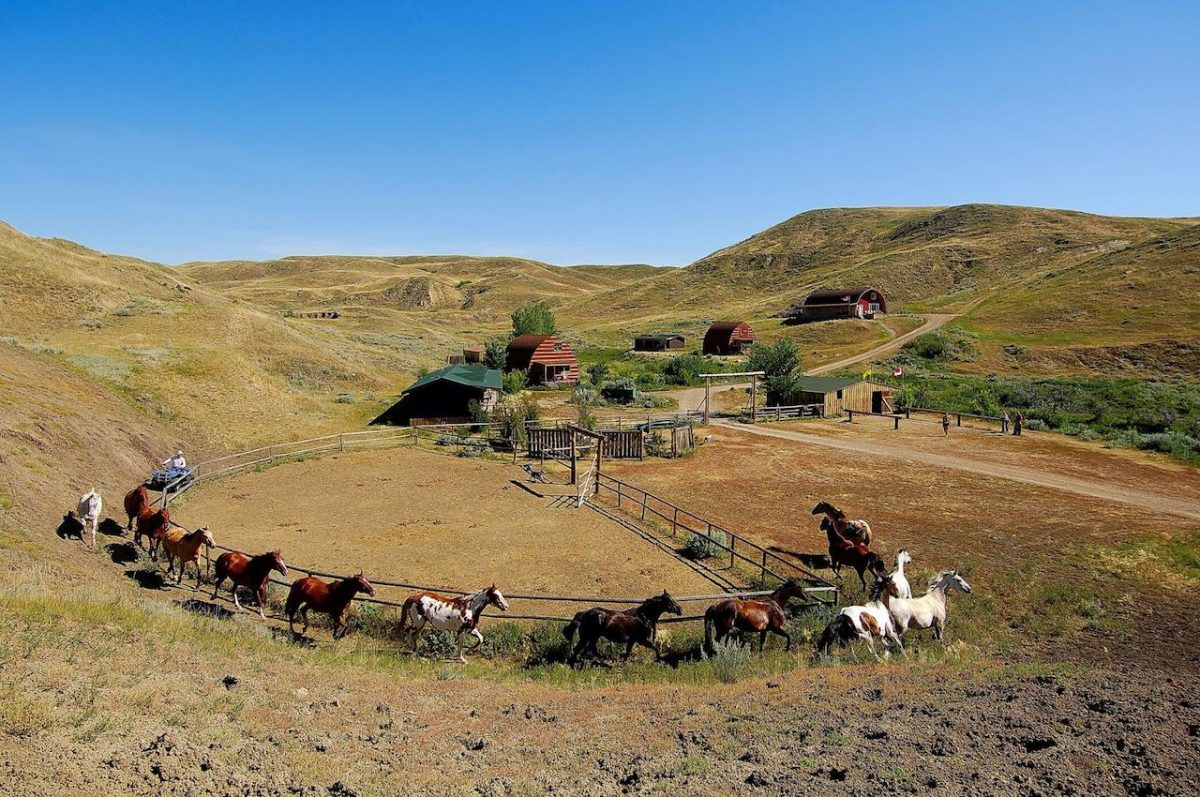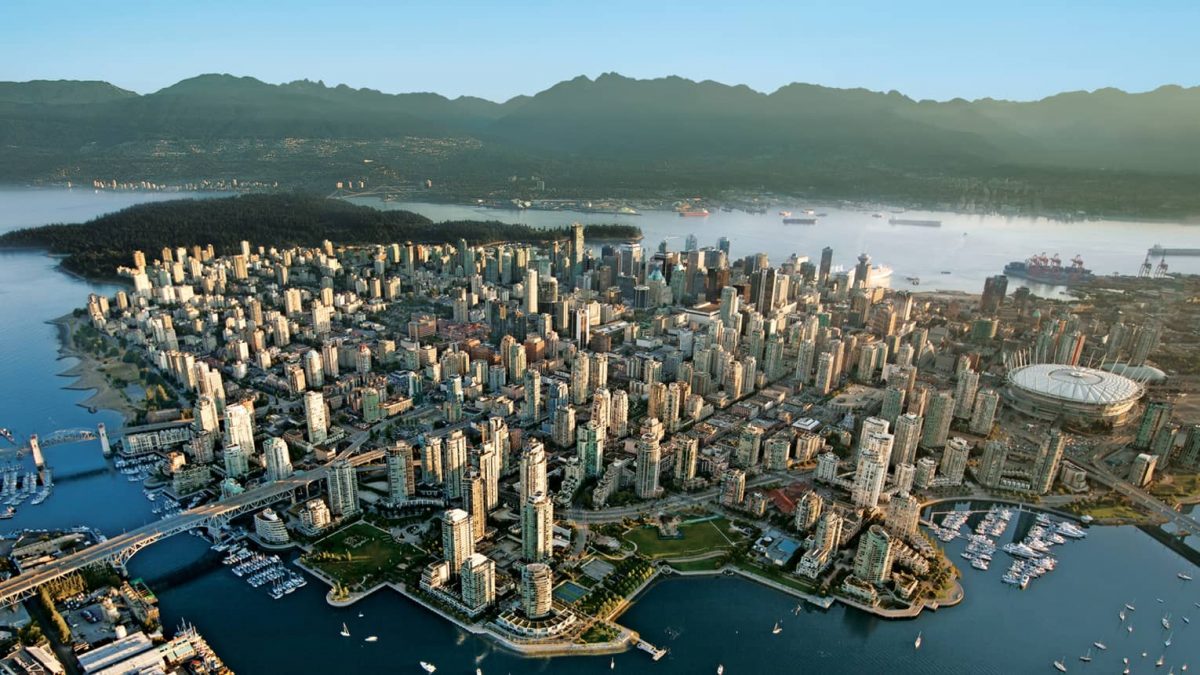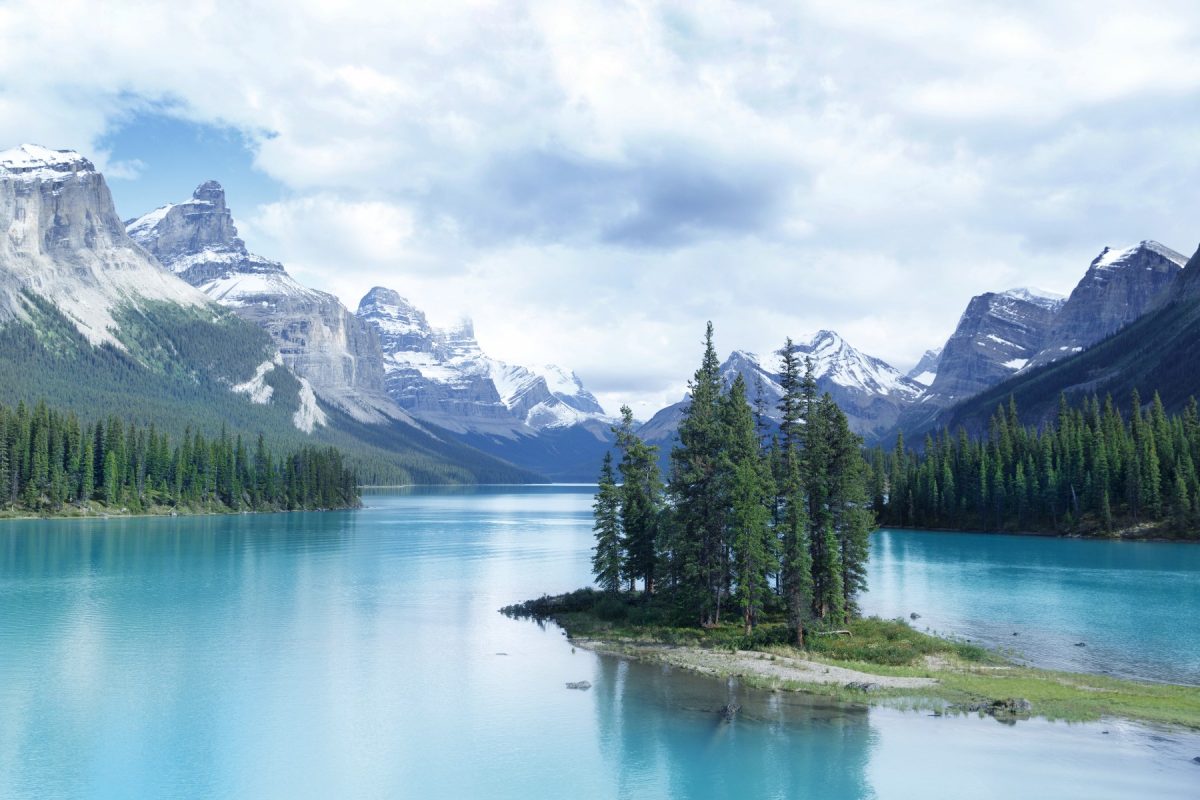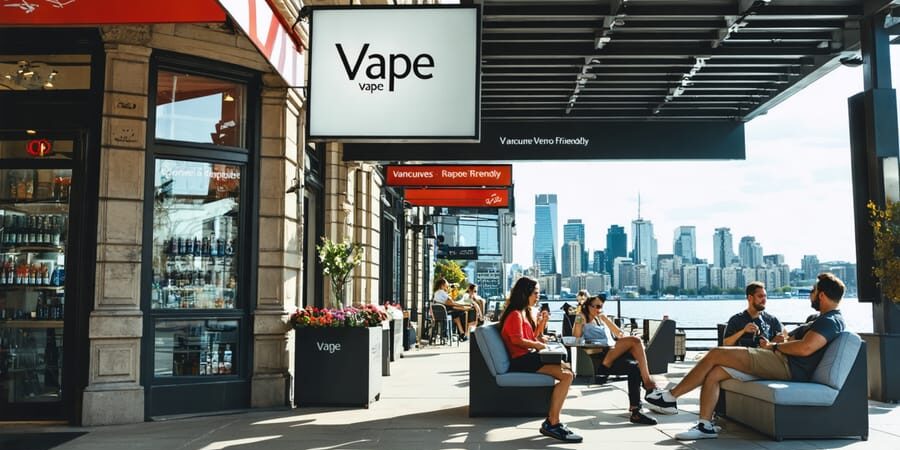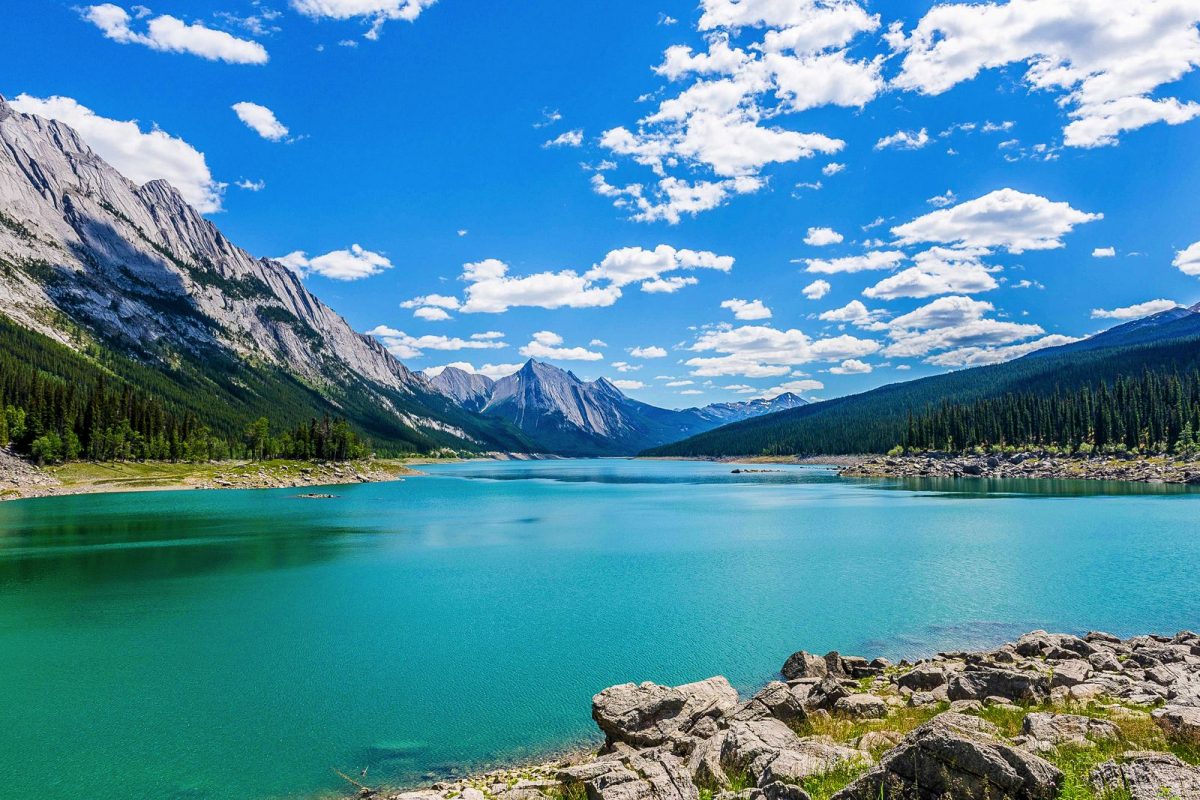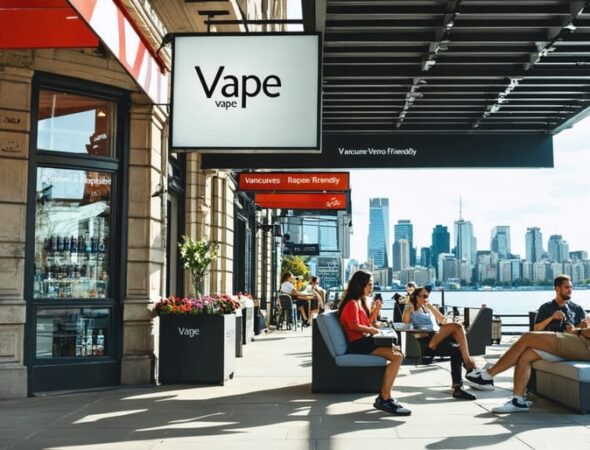Pack your BDY signature collection and discover Canada’s most vape-friendly destinations, where clear regulations and welcoming attitudes make traveling with your device hassle-free. From Vancouver’s vibrant vaping community to Montreal’s European-inspired café culture, Canadian vapers can explore diverse cities while staying compliant with local laws.
Navigate provincial regulations confidently – British Columbia and Ontario lead with progressive vaping policies, designated outdoor spaces, and established vape shops that cater to both locals and tourists. Quebec’s distinctive approach balances cultural appreciation with responsible vaping practices, creating an atmosphere where informed travelers can enjoy their devices respectfully.
Beyond urban centers, discover vape-friendly resorts and accommodations that understand modern travelers’ needs. Many boutique hotels now offer dedicated vaping areas, while national parks maintain clear guidelines for responsible use. This evolving landscape reflects Canada’s balanced approach to vaping culture, ensuring travelers can maintain their lifestyle while experiencing the country’s magnificent destinations.
Understanding Canadian Vaping Regulations for Travelers
Domestic Travel Guidelines
When traveling within Canada, it’s essential to know the rules for carrying your vaping devices. On domestic flights, Transport Canada permits e-cigarettes and vaping devices in carry-on baggage only – never in checked luggage. Your device’s batteries must be removed and stored separately in protective cases.
Keep your e-liquids in containers of 100ml or less, placed in a clear, resealable plastic bag along with other liquids. The total volume shouldn’t exceed 1L. Remember to drain your tanks before flying to prevent leakage due to cabin pressure changes.
For train travel on VIA Rail, vaping devices are allowed in both carry-on and checked baggage, though it’s recommended to keep them with you. Be aware that using vaping devices is prohibited on all trains and in station buildings.
Whether flying or taking the train, always pack your vaping supplies in clear, easily accessible containers. This makes security screening smoother and helps avoid any confusion with airport or station staff. Consider bringing documentation showing your device’s specifications if asked by security personnel.
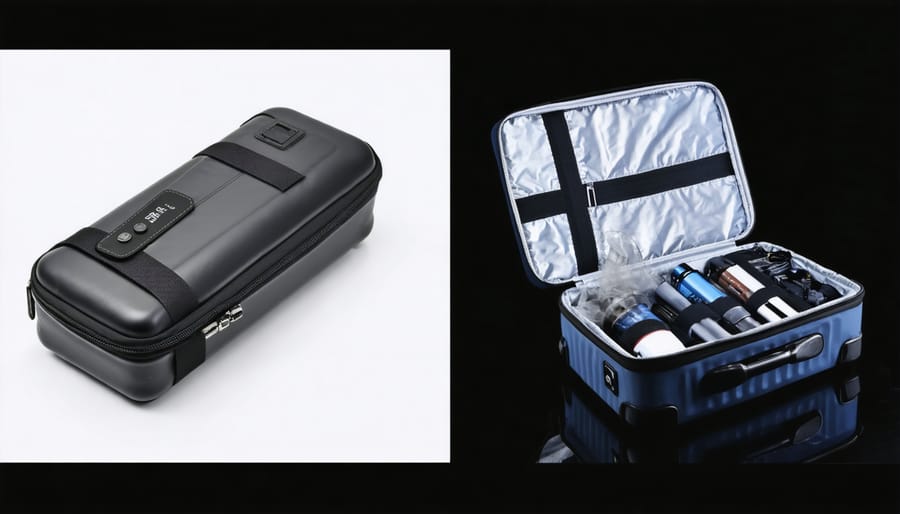
Cross-Border Considerations
Before packing your vaping devices for international travel, familiarize yourself with Canada’s strict regulations. When departing Canada, ensure your devices and e-liquids comply with airline restrictions – pack them in carry-on luggage only, with liquids following the standard 100ml rule in clear, resealable bags.
Be aware that regulations vary significantly between countries. Some destinations may completely ban vaping products, while others have specific rules about nicotine content and device types. Always research your destination’s current laws before traveling, as regulations can change frequently.
When returning to Canada, you can bring vaping devices and a reasonable amount of e-liquid for personal use. However, be prepared to declare these items at customs. Keep your receipts and original packaging to prove the products meet Canadian standards.
Remember that selling or giving away vaping products purchased abroad is illegal in Canada. Consider documenting your vaping equipment (including serial numbers) before departure to avoid any confusion upon return.
Vape-Friendly Cities Across Canada
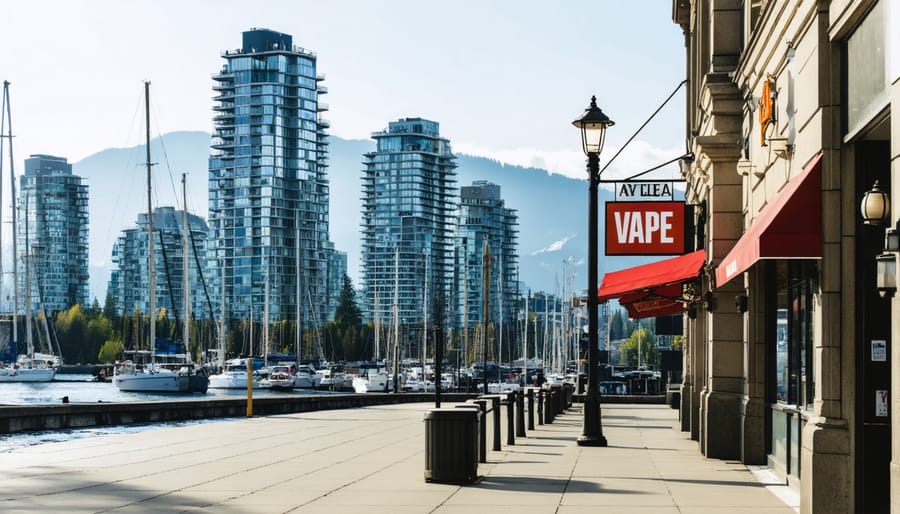
Western Canada’s Vaping Havens
Western Canada offers a welcoming atmosphere for vaping enthusiasts, with cities like Vancouver leading the way in progressive vaping culture. While exploring Vancouver’s vibrant scene, you’ll discover numerous vape-friendly establishments, from cozy cafes to designated outdoor spaces where you can enjoy your device responsibly.
Calgary’s vaping community has grown significantly, with dedicated shops and lounges scattered throughout the city’s entertainment districts. The city’s clear regulations make it easy for visitors to understand where vaping is permitted, particularly in the popular 17th Avenue and Kensington areas.
Edmonton and Victoria also embrace the vaping culture, offering unique spaces where enthusiasts can gather. These cities perfectly balance urban amenities with access to scenic Western Canada destinations, making them ideal bases for longer trips.
Remember to respect local bylaws, which typically restrict vaping in enclosed public spaces and near building entrances. Many establishments have designated outdoor areas for vapers, often featuring comfortable seating and weather protection. When visiting any Western Canadian city, check with your accommodation provider about their vaping policies, as many hotels now offer vape-friendly rooms or dedicated outdoor spaces.
Professional tip: Join local vaping community forums before your trip to connect with fellow enthusiasts and get insider tips on the best spots to visit.
Central Canada’s Vaping Culture
Central Canada’s urban hubs offer a vibrant and diverse vaping culture, with Toronto and Montreal leading the way. In Toronto’s trendy Queen West and Kensington Market neighborhoods, you’ll find numerous vape-friendly cafes and lounges where enthusiasts gather to share experiences and try new flavors. Many establishments have adapted their outdoor patios to accommodate vapers while respecting local regulations.
Montreal’s distinct European flair extends to its vaping scene, particularly in the Plateau-Mont-Royal and Mile End districts. These areas feature an eclectic mix of vape shops, specialized boutiques, and relaxed bistros where vaping is welcome in designated areas. The city’s famous terrasses (outdoor patios) provide perfect spots for enjoying your device while taking in the local atmosphere.
Both cities maintain strict compliance with provincial regulations, so always check current rules before visiting. In Toronto, popular meetup spots include the Entertainment District and Harbor Front, while Montreal vapers often gather along Saint-Laurent Boulevard and the Old Port area.
For day trips, consider exploring the vape-friendly communities in the Greater Toronto Area, such as Mississauga and Vaughan, or venture to Quebec City’s charming Lower Town, where several establishments cater to vapers while offering stunning views of the historic district.
Atlantic Canada’s Vaping Spots
Atlantic Canada’s maritime charm extends to its vaping culture, with Halifax leading the way as the region’s most vape-friendly urban destination. The Halifax waterfront offers countless spots where you can enjoy your device while taking in stunning harbor views. Popular locations include the Halifax Public Gardens and Point Pleasant Park, where designated smoking areas provide comfortable spaces for vapers.
St. John’s, Newfoundland, welcomes vapers with its colorful row houses and vibrant pub scene. Signal Hill offers breathtaking ocean vistas and designated areas where you can safely vape while whale watching or enjoying the coastal breeze. Just remember to respect local bylaws that require a 9-meter distance from building entrances.
Prince Edward Island’s laid-back atmosphere makes it an ideal destination for vapers seeking a peaceful maritime experience. The red sand beaches and boardwalks of Charlottetown provide ample outdoor spaces where you can vape responsibly while soaking in the island’s natural beauty.
In New Brunswick, Saint John’s historic uptown district features several vape shops and lounges where you can stock up on supplies or meet fellow enthusiasts. The city’s famous Market Square offers designated outdoor areas perfect for an evening vape session while watching the famous Bay of Fundy tides.
Remember to always check current municipal regulations, as vaping bylaws can vary between maritime cities and towns.
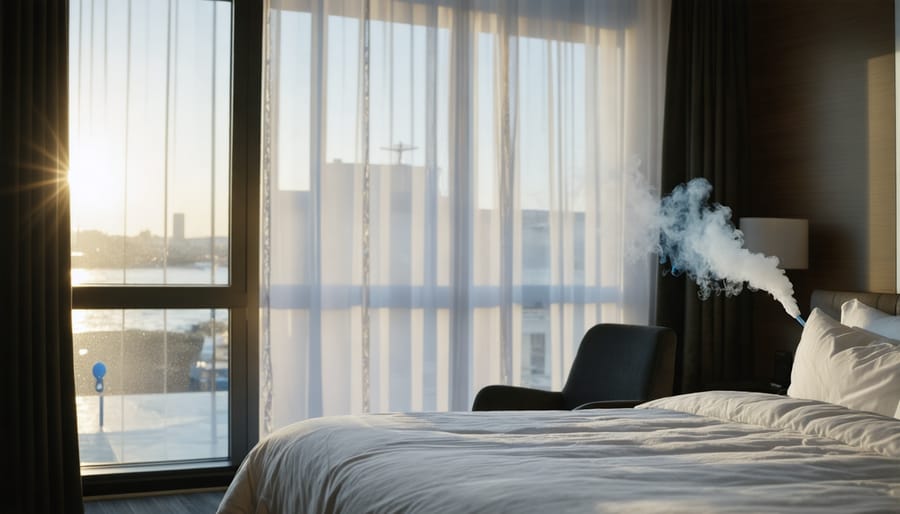
Vape-Friendly Accommodations
Finding vape-friendly accommodations across Canada has become increasingly accessible, with many establishments recognizing the needs of their vaping guests. From luxury hotels in Vancouver to cozy bed-and-breakfasts in Nova Scotia, travelers can discover welcoming spaces that cater to their vaping preferences while visiting popular tourist destinations.
Many boutique hotels now offer designated vaping areas on their properties, complete with comfortable seating and scenic views. The West Coast Collection of hotels, particularly in British Columbia, leads the way with dedicated outdoor lounges and balconies specifically designed for vapers. These spaces often feature weather protection and heating elements for year-round comfort.
For a more private experience, vacation rental platforms have begun including “vape-friendly” filters in their search options. Look for properties that specifically mention outdoor vaping areas or private balconies. Many hosts in regions like the Okanagan Valley and Muskoka Lakes advertise their properties as vape-friendly, offering detailed guidelines about where vaping is permitted on the premises.
When booking your accommodation, consider these vape-friendly features:
– Private balconies or patios
– Designated outdoor vaping areas
– Well-ventilated common spaces
– Clear policies regarding indoor and outdoor use
– Proximity to local vape shops
Remember to always confirm the establishment’s specific vaping policies during booking, as rules can vary significantly between properties. Many hotels require guests to vape at least 6 meters from building entrances, while others may have designated smoking areas that also accommodate vapers.
For corporate travelers, several business hotels across major Canadian cities now offer specialized floors or wings where vaping is permitted on private balconies, making it easier to maintain your routine while away from home.
Essential Tips for Traveling Vapers
Packing and Storage Solutions
When traveling with your vaping devices, proper packing and storage are essential for both safety and compliance with transportation regulations. Start by investing in a sturdy, dedicated carrying case that protects your equipment from damage and prevents accidental activation during transit.
Always remove batteries from your devices and store them separately in protective cases. Pack your e-liquids in leak-proof containers within sealed plastic bags, keeping in mind that Canadian air travel restrictions limit liquids to 100ml containers. Consider using silicone caps on your tanks to prevent leakage due to air pressure changes during flights.
For road trips across Canada, store your vaping supplies in a cool, dry place away from direct sunlight. The glove compartment or center console works well, but avoid leaving devices in your car during extreme weather conditions. Keep a small cleaning kit handy, including microfiber cloths and cotton swabs, to maintain your device while on the go.
When booking accommodations, pack a designated storage pouch that keeps your equipment organized and easily accessible. Many experienced travelers recommend using a separate compartment for spare coils, wicks, and tools. Remember to bring only what you need for your trip duration, plus a reasonable backup supply in case of equipment failure.
For day trips, a compact carrying case that fits in your daypack is ideal. Always respect local storage regulations and keep your devices concealed when not in use.
Finding Local Vape Shops
When you’re exploring Canada’s vaping-friendly destinations, knowing where to find supplies is essential for a stress-free journey. Most major Canadian cities have well-established vape shops in their downtown cores and popular shopping districts. Popular apps like Google Maps and Yelp can help you locate nearby shops, but it’s worth checking recent reviews to ensure they’re still operating.
For the most reliable experience, consider reaching out to local vaping communities through social media platforms or Canadian vaping forums before your trip. These communities often share recommendations for reputable shops and can provide insights about current stock and pricing.
In tourist-heavy areas like Vancouver’s Robson Street, Toronto’s Queen Street West, and Montreal’s Saint-Catherine Street, you’ll find multiple vape retailers within walking distance of each other. Many shops in these areas cater to travelers with single-unit sales and travel-sized e-liquid options.
Remember to verify operating hours before making a special trip, as some local shops may have restricted hours on weekends or holidays. It’s also wise to call ahead if you’re looking for specific products or brands, as inventory can vary significantly between locations. Some shops offer online stock checking through their websites, making it easier to plan your supply runs while exploring new cities.
Consider joining loyalty programs at larger vape shop chains, as these often have multiple locations across different Canadian cities and can offer consistent pricing and product availability.
As we wrap up our journey through Canada’s vaping-friendly destinations, remember that successful travel with your vaping devices comes down to proper planning and respect for local regulations. Whether you’re exploring the vibrant streets of Vancouver, enjoying the cultural richness of Montreal, or discovering hidden gems in Halifax, being a responsible vaper ensures a smooth and enjoyable experience for everyone.
Keep our key tips in mind: always research your destination’s specific vaping laws, pack your devices and e-liquids properly for air travel, carry necessary documentation, and be mindful of designated vaping areas. Consider joining local vaping communities online before your trip to get the most up-to-date information and connect with fellow enthusiasts who can share their experiences.
The Canadian vaping landscape continues to evolve, and staying informed about current regulations is crucial for any traveling vaper. Remember to always prioritize safety, courtesy, and compliance with local guidelines. By following these principles, you’ll not only enjoy your travels across our beautiful country but also help maintain a positive image of the vaping community.
Whether you’re a seasoned traveler or planning your first vape-friendly adventure, Canada offers countless destinations where you can comfortably enjoy your vaping experience while exploring all the natural beauty and cultural diversity our country has to offer.


